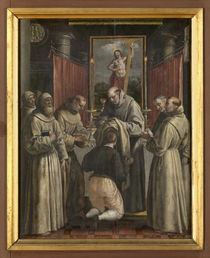The Catholic Defender: Saint Ephrem Doctor of the Church
- Donald Hartley

- Jun 9
- 3 min read
Deepertruth with special permission and aid with Franiciscan Media, a great team for the Lord

Ephrem is the patron saint for Spiritual Directors and Spiritual Leaders. Many of them call upon St. Ephrem today for his intercession in times of trouble and discernment.
Poet, teacher, orator, and defender of the faith, Ephrem is the only Syriac Christian recognized as a doctor of the Church. He took upon himself the special task of opposing the many false doctrines rampant at his time, always remaining a true and forceful defender of the Catholic Church.
Ephrem was born in the city of Nisibis in approximately 306. Traditions differ on the question of his family background, with some sources attesting that his father was at one time a pagan priest.
Born in Nisibis, Mesopotamia, he was baptized as a young man and became famous as a teacher in his native city. When the Christian emperor had to cede Nisibis to the Persians, Ephrem fled as a refugee to Edessa, along with many other Christians. He is credited with attracting great glory to the biblical school there. He was ordained a deacon but declined becoming a priest. Ephrem was said to have avoided presbyteral consecration by feigning madness!

He had a prolific pen, and his writings best illumine his holiness. Although he was not a man of great scholarship, his works reflect deep insight and knowledge of the Scriptures. In writing about the mysteries of humanity’s redemption, Ephrem reveals a realistic and humanly sympathetic spirit and a great devotion to the humanity of Jesus. It is said that his poetic account of the Last Judgment inspired Dante.
St. Ephrem is the common teacher of the Syriac theological tradition whose preferred medium is poetry. Named a doctor of the Church by Benedict XV, Ephrem emphasizes that the ascetical and mystical experience of wonder is the criterion for authentic theologizing.
It is surprising to read that he wrote hymns against the heretics of his day. He would take the popular songs of the heretical groups and using their melodies, compose beautiful hymns embodying orthodox doctrine. Ephrem became one of the first to introduce song into the Church’s public worship as a means of instruction for the faithful. His many hymns have earned him the title “Harp of the Holy Spirit.”
Ephrem preferred a simple, austere life, living in a small cave overlooking the city of Edessa. It was here that he died around 373.
He was declared a Doctor of the Church in the Roman Catholic Church in 1920. Ephrem is also credited as the founder of the School of Nisibis, which, in later centuries, was the centre of learning of the Church of the East. Ephrem wrote a wide variety of hymns, poems, and sermons in verse, as well as prose exegesis.
Many Catholics still find singing in church a problem, probably because of the rather individualistic piety that they inherited. Yet singing has been a tradition of both the Old and the New Testaments. It is an excellent way of expressing and creating a community spirit of unity as well as of joy. An ancient historian testifies that Ephrem’s hymns “lent luster to the Christian assemblies.” We need some modern Ephrems—and cooperating singers—to do the same for our Christian assemblies today.
O Lord and Master of my life, a spirit of idleness, curiosity, ambition, and idle talking; give me not. But a spirit of chastity, humility, patience, and love, bestow upon me, Thy servant. Yea, O Lord King: grant me to see mine own failings, and not to condemn others; for blessed art Thou unto the ages of ages. Amen.





















Comments